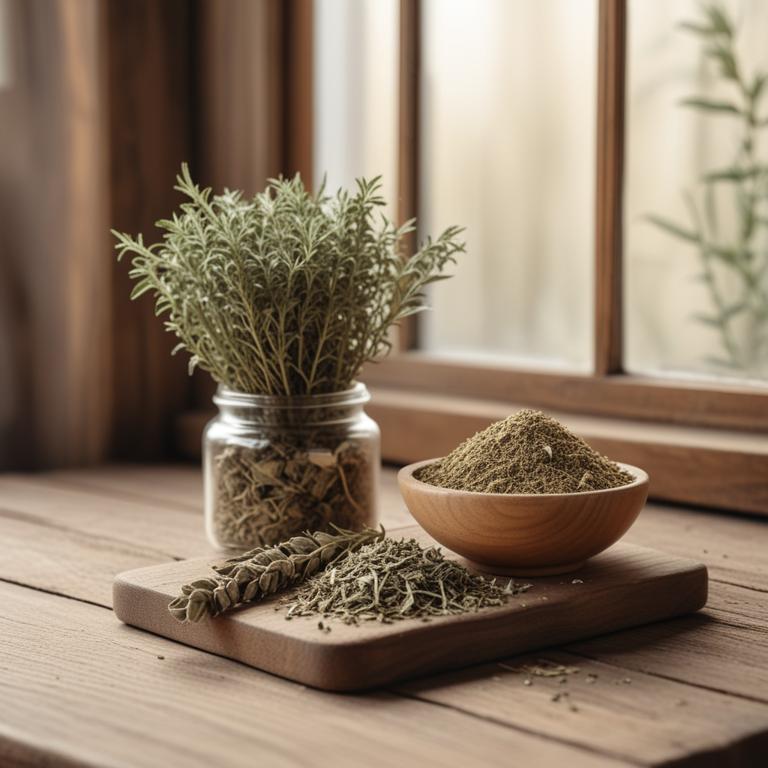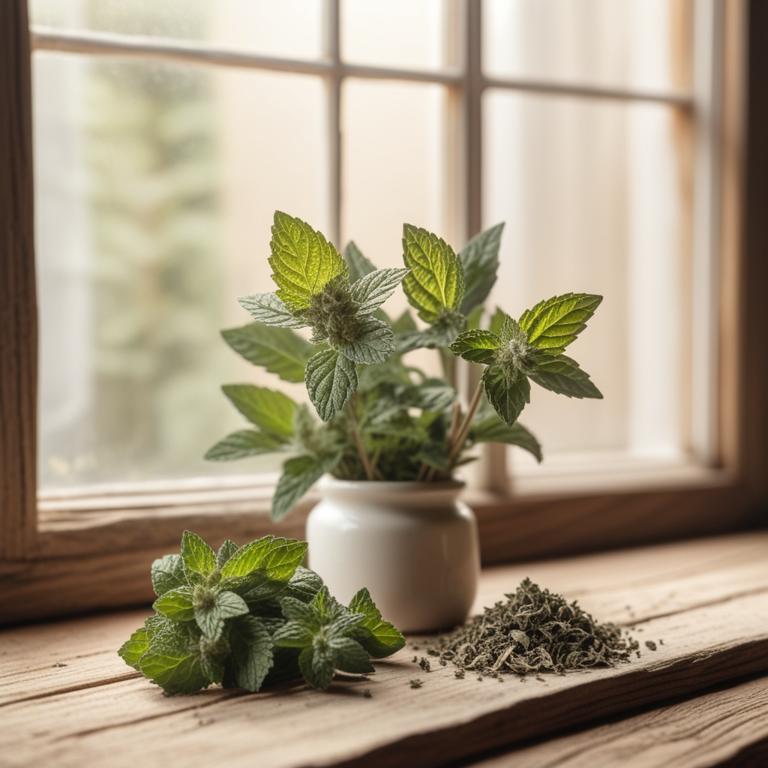Updated: Dec 1, 2024
The Natural Approach to Gum Pain: Causes and Herbal Treatments

Gum pain, also known as gingivitis, is a common problem that can cause discomfort and affect your daily life.
It's an inflammation of the gums that can make eating, speaking, and even smiling painful. Gum pain is often caused by poor oral hygiene, such as not brushing or flossing regularly, and can also be triggered by certain health conditions like diabetes or hormonal changes. When gum pain strikes, it can be a challenge to manage. But, nature has provided us with some healing herbs that can help soothe and calm the pain.
One of these herbs is clove oil, which has natural anti-inflammatory properties that can reduce swelling and ease pain. Another herb, eucalyptus, has antibacterial properties that can help combat the bacteria that cause gum pain. You can use these herbs in various forms to relieve gum pain. You can make a tea by steeping fresh eucalyptus leaves in hot water and then use it as a mouthwash to reduce inflammation and kill bacteria. Alternatively, you can apply clove oil directly to the affected area using a cotton swab.
You can also chew on clove buds or add eucalyptus oil to your toothpaste for a more gentle approach.
Table of Contents
What are the root causes of gum pain?
The main causes of gum pain are often related to issues with the teeth and gums.
Periodontitis is a common cause of gum pain, where the gums and bones that support the teeth become infected, leading to pain and swelling. This usually occurs due to poor dental hygiene, allowing bacteria to build up and cause damage. Gingivitis is another cause, where the gums become inflamed, often due to inadequate brushing and flossing, leading to pain and discomfort. Tooth decay and cavities are also major contributors to gum pain. When bacteria in the mouth break down food, they release acid, which can damage the teeth and gums.
If left untreated, this can lead to pain and sensitivity in the affected area. Dry mouth, caused by a lack of saliva, can also contribute to gum pain. Saliva helps to wash away bacteria and food particles, but without enough saliva, the gums can become dry and irritated, leading to pain. Lastly, a gum infection can be a direct cause of gum pain. This can occur when bacteria enter the gums through a cut or wound, causing an infection.
If left untreated, the infection can spread and lead to more severe symptoms, including pain and swelling.
What benefits can be realized from using herbs to treat gum pain?
Using herbs for gum pain can be a great alternative to traditional treatments.
One of the main benefits is that they are often natural and free from harsh chemicals, which can be irritating to the gums and mouth. These herbs can help to reduce inflammation and swelling, making it easier to eat and talk.
They also have antibacterial properties, which can help to prevent infections and promote healing. Additionally, they can help to soothe and calm the gums, making them less sensitive and painful. Many of these herbs have been used for centuries in traditional medicine, so they have a proven track record of effectiveness.
They can also be used in combination with other treatments, such as saltwater rinses or dental care, to enhance their benefits and speed up the healing process.
What are the main medicinal herbs that help relieve gum pain?

If you're experiencing gum pain, you might want to consider trying some herbal remedies.
One herb that could help is peppermint (Mentha x piperita), which has anti-inflammatory properties that can reduce swelling and ease pain in the gums. This makes it a great option for people with gum inflammation, also known as gingivitis. Another herb that might be helpful is ginger (Zingiber officinale), which has natural pain-relieving properties. Ginger can help reduce inflammation and ease pain, making it a good choice for people with gum pain caused by inflammation. Some studies even suggest that ginger can help reduce the severity of gum disease. If you have a weakened immune system or are prone to infections, you might want to try echinacea (Echinacea purpurea). This herb has natural immune-boosting properties that can help fight off infections and speed up the healing process.
This makes it a great option for people with gum disease caused by bacterial or viral infections. Sage (Salvia officinalis) is another herb that could be helpful for gum pain. It has natural antibacterial properties that can help reduce the presence of bacteria in the mouth, which can contribute to gum disease. Some studies even suggest that sage can help reduce inflammation and ease pain in the gums. Licorice root (Glycyrrhiza glabra) is also worth considering. It has natural anti-inflammatory properties that can help reduce swelling and ease pain in the gums. Additionally, licorice root has been shown to have antibacterial properties, which can help reduce the presence of bacteria in the mouth and promote healing.
These herbs can be consumed in various forms, such as teas, tinctures, or capsules, and can be used in combination with other treatments to help manage gum pain.
What herbal treatments are commonly prescribed for gum pain?

If you're experiencing gum pain, there are some herbal preparations that may help.
One option is taking a tincture capsule, which is a concentrated liquid extract of herbs in a small capsule. Tincture capsules are good because they're easy to take and can provide quick relief from gum pain. Another way to use herbs for gum pain is by making a tea. To make a tea, you steep dried herbs in hot water, then strain and drink the liquid. Herbs like peppermint and chamomile can help soothe and calm gum pain. A decoction is similar to a tea, but it's made with harder herbs like roots and bark.
To make a decoction, you boil the herbs in water, then strain and drink the liquid. Decoctions are good for gum pain because they can penetrate deeper into the gums and provide longer-lasting relief. A salve is a topical preparation that you apply directly to the affected area. Salves can be made with herbs like aloe vera and tea tree oil, which have anti-inflammatory and antibacterial properties that can help soothe and heal gum pain. Finally, you can make an infusion, which is similar to a tea but made with delicate herbs like flowers and leaves. To make an infusion, you steep the herbs in cold water, then strain and drink the liquid.
Infusions are good for gum pain because they're gentle and can be used for a longer period of time.
Additional Resources:
Should you avoid certain herbs when you have gum pain?
If you're experiencing gum pain, you should be careful with certain herbs.
For example, rosemary (Rosmarinus officinalis) has essential oils that can cause irritation and discomfort in the mouth, especially if you have gum problems. This is because the oils in rosemary can stimulate the gums and make them more sensitive. Similarly, cinnamon (Cinnamomum verum) is known to be quite potent, and its strong flavor and aroma can exacerbate gum pain.
Thyme (Thymus vulgaris) has antibacterial properties, but its essential oils can also cause inflammation and discomfort in the mouth, which may worsen gum pain. Turmeric (Curcuma longa) contains a compound called curcumin, which has anti-inflammatory properties, but it can also cause irritation and discomfort in some people, especially if they have gum problems. Black pepper (Piper nigrum) has a strong flavor and can cause mouth irritation, which may make gum pain worse.
When using these herbs, it's essential to use them in moderation and under the guidance of a healthcare professional, especially if you have gum pain or other oral health issues.
FAQ
Are there any specific herbs that can prevent gum pain?
Turmeric has anti-inflammatory properties that can help reduce gum pain.
Ginger also has natural anti-inflammatory compounds that can soothe sore gums. Cloves contain a compound that can numb the pain and reduce inflammation.
These herbs can be used in teas or applied directly to the gums to help alleviate discomfort.
Is it safe to use herbal remedies for gum pain during pregnancy?
When pregnant, it's best to be cautious with herbal remedies.
Some might not be safe for you or your baby. For gum pain, you could try a warm saltwater rinse to ease discomfort. Avoid using herbs that can stimulate the uterus or cause bleeding, like pennyroyal or blue cohosh.
Opt for gentle, well-known remedies like aloe vera or peppermint.
Are there any herbs that can reduce the frequency of gum pain?
Some herbs like clove and licorice root have been used to help reduce gum pain.
Clove oil is known for its anti-inflammatory properties, which can help soothe irritated gums.
Licorice root, on the other hand, has been shown to reduce inflammation and kill bacteria that can cause gum pain.
Can i combine different herbal remedies for gum pain?
Combining herbal remedies for gum pain can be a bit tricky.
Some herbs, like clove and eucalyptus, have strong properties that might interact with each other. For example, clove can thin the blood, while eucalyptus can slow its flow.
To be safe, start with small amounts of each remedy and gradually increase as needed, but always be cautious and monitor your body's response.
Related Articles

Rashes: Causes and Homeopathic Herbal Solutions

Treating Burns: Common Causes, Herbal Remedies, and Natural Preparations

Causes and Herbal Remedies for Psoriasis: A Comprehensive Guide

Natural Remedies for Foot Odor Using Medicinal Herbs

The Causes and Effects of Stye: Medicinal Herbs and Herbal Preparations for Relief






